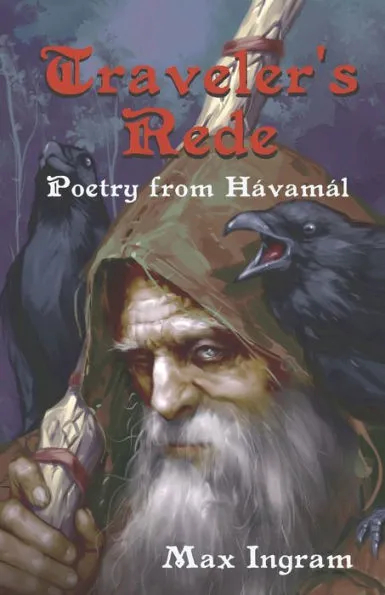Max Ingram’s Traveler’s Rede: Poetry from Hávamál, is a terrific look behind the curtain at how and why a translator chooses the words they do that make up the final product of a translation, and what license they may take with the original words and/or meanings. The book is laid out simply and well: the reader is presented with the author’s translation in stanza form, below that is the original Old Norse with the literal translation of the Old Norse words, and the following page contains notes and further details where Ingram felt more explanation or information was needed.
I have never been particularly gifted at learning new languages, so to see the Old Norse laid out so clearly, with translations and explanations, really helped to give me a fuller understanding of the contexts in which a translator works.
Ingram himself lays out an example of this in the “About the Translation” section at the start of the book:
“Example: ‘that <man>,’ in which only the word ‘that’ is present, but the masculine grammar implies the subject is a man.”
And, honestly, it was fun to say the Old Norse words with the help of an online pronunciation guide as I read through the book.
Should you not be quite as much of a word nerd as I am, the rede itself is a great read and guide for travelers: what to expect from both hosts and other travelers, a guide on what to do (E.g.,: be polite; listen more than you speak, etc.) and what not to do (E.g., don’t be a drunken fool; don’t overstay your welcome, etc.), and honestly, just general common sense things that would apply even to those traveling today. In addition to good traveling advice, there is quite a bit of just good advice in general.
In the context of what it meant to travel in the ancient Norse world, this guide might well save the life of a traveler: warm and dry clothes; a generous fire; and hot meal—all very valuable in a harsh world where dying of exposure or starvation from lack of shelter or adequate provisioning was a very real possibility. And should a traveler find themselves needing accommodation on the way back through, it’s nice to have behaved well enough that they’d be welcome again.
I’m pleased to be adding Ingram’s book to my own growing collection of translation from the Hávamál, and would recommend this to anyone looking to learn more about the roots of the work.
~review by Mara McTavish
Author: Max Ingram
Publisher: Bone Forge Books, 2023
pp. 171

